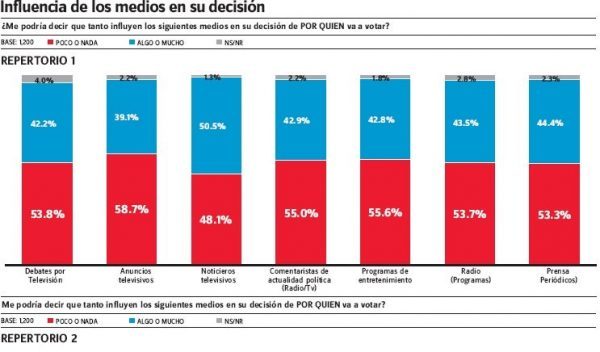
The usual means of political propaganda, whether they are rallies, billboard propaganda, promotional items, television and radio ads, or digital media, are not so decisive in the voter’s decision to go to vote, according to the findings of the Gallup-Hoy public opinion study on 16-20 January 2020.
According to these results, 58.7% of adults said that television ads have little or no influence on who they will vote for. 55% of eligible voters said that political commentators and entertainment programs have little or no influence on their choice at the polls. 53% of those polled, said that radio programs and newspapers have no influence on them either.
The survey says that televised debates, so demanded by various sectors, influence little or nothing in the decision of 53.8% of voters. Only 50% said that television news programs have a little or a lot of influence on who they will vote for.
69.6% of the citizens say that the billboards and signs, very expensive propaganda media that politicians use to promote their candidacies, influence little or nothing in their preference at the moment of realizing their right to vote.
71.6% of those surveyed said that the delivery of brochures and flyers does not influence their decision. 67% say promotional items have little or no influence on their electoral preference. 57% said that rallies by politicians have little or no influence on their voting.
New technologies. Information technologies, used massively as new propaganda mechanisms, do not necessarily have a major impact on voters either, according to the Gallup-Hoy results. For 68% of the population, cell phone text messages and emails from parties or candidates have little or no influence on their voting decisions.
Of the candidates’ websites, which contain activities or their proposals, 63.7% said that they have little or no influence on their preferences.
Regarding social media, which are known to create trends, 54% said that their level of influence in terms of the electoral decisions they make is little or non-existent.
Read more in Spanish:
Hoy
30 January 2020

